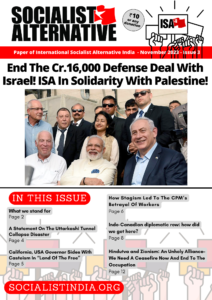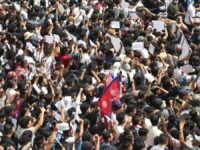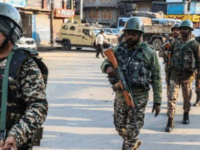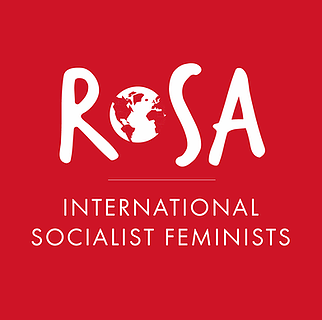May 1: International Workers’ Day — Workers of the World Unite Against Decaying Capitalism
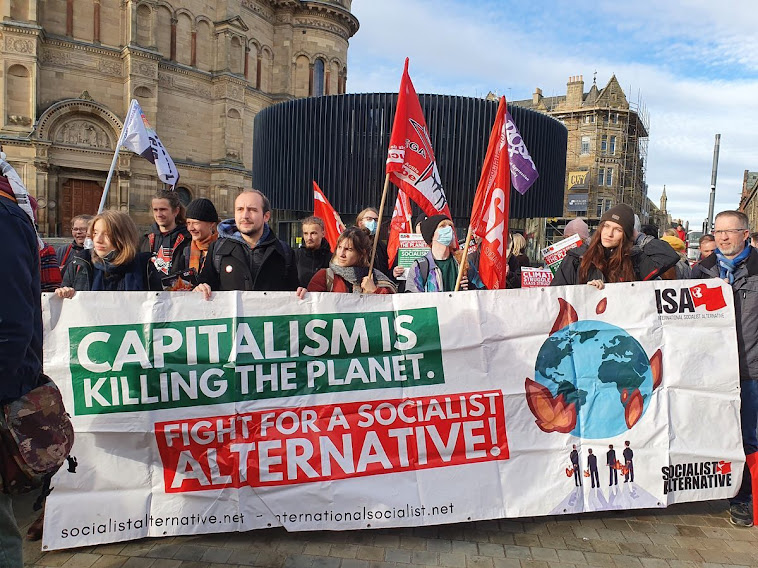
“The burdens of war will consume the best energies of the peoples for decades, endanger the achievements of social reform, and hinder every step forward. Cultural devastation, economic decline, political reaction these are the blessings of this horrible conflict of nations. Thus the war reveals the naked figure of modern capitalism which has become irreconcilable, not only with the interests of the laboring masses, not only with the requirements of historical development, but also with the elementary conditions of human intercourse.”
Written over 100 years ago in 1915, based on a draft by Leon Trotsky, this was part of the manifesto adopted by delegates to the “Zimmerwald Conference”, a small gathering of International Socialists who opposed WW1. The meeting had been preceded by both the “International Socialist Women’s Conference” and Conference of “Socialist Youth”. In line with the principles of revolutionary socialism, they broke with the reformist social democrats who supported the capitalist classes of their own countries in the war. Although Zimmerwald was attended by just 38 delegates, several later became famous for their role in revolutions that strived to create a world without war by uprooting its cause — capitalism.
The Manifesto, intended for a different epoch, remains entirely relevant for International Workers Day 2022. But if at that time “modern capitalism” had become irreconcilable with the elementary conditions of human intercourse, it has today created such a catastrophic situation that it has now become increasingly irreconcilable with dignified human existence.
Pandemic reveals a sick system
This is no exaggeration: the world is barely emerging from the worst pandemic since the flu epidemic that ravaged the world in 1918 and 1919. Indeed, the Zimmerwald Manifesto even commented that the “improvement in welfare proclaimed at the outbreak of the war — want and privation, unemployment and high prices, undernourishment and epidemics are the actual results.”
Despite all the advancements of modern science and the sacrifices made by health workers across the world, Covid has taken millions of lives, on top of other global epidemics like Cholera– barely noticed because they affect mainly the poor countries. More people die every year from poverty related, and entirely preventable diseases, than from even the horrific Covid.
During the pandemic, capitalism has demonstrated the height of cynical greed. State financing has been used to research and produce the vaccines, while private companies have made incredible profits out of their sale and distribution. Rather than fully and immediately removing patents, national governments have used vaccine nationalism — those in the developed world have been mostly vaccinated, whilst the poorer parts of the world have been left unprotected, making almost inevitable the constant appearance of new, possibly more dangerous viruses.
A world of war
Now the competition between the imperialist powers, driven by the New Cold War, has sparked the biggest war in Europe since WW2. With the threat, which many had long since forgotten, of a wider war including the use of nuclear weapons. If actually realized this could lead to the destruction of the world as we know it.
As ISA said in its recent statement on the War in Ukraine:
“A key feature is clearly rising imperialist militarism accompanied by the whipping up of nationalism and a rapid break-up of the world into two imperialist-led camps in a new, not-so Cold War.”
The human cost is already horrific. In less than two months the number of fatalities — military and civilian — is already close to half the figure of those who died during the five years of wars in the former Yugoslavia. Five million Ukrainians have fled abroad, and as many again are ‘internally displaced’. Whatever the outcome of the fighting, the region will never return to what it was before.
Whilst attention is on Ukraine, the global media barely mentions that in 2022 another 21 countries are wracked by civil war, drug war, terrorist insurgency or ethnic violence. Whilst US imperialism and NATO present the war in Ukraine as one to defend “democracy” against Russian authoritarianism, they and their allies support many dictatorial governments elsewhere, including those who wage wars in Yemen, Iraq, Syria, Libya, Ethiopia and elsewhere.
Meanwhile the heroic resistance by the Myanmar people continues against the military regime, which is supported by Chinese and Russian imperialism. Already in 2021 global expenditure on weaponry hit its highest ever level of $2.1 trillion — 62% of which was by just five countries — the US, China, UK, Russia and India. It has risen even higher this year.
Climate crisis intensifying
It is barely six months since the COP 26 summit in Scotland, when the world powers once again dramatically failed to come up with any real solution to the looming climate catastrophe. Now the war in Ukraine has dramatically blown out of the water even the empty promises they then made.
The main strategy of western imperialist powers to wean themselves off of Russian energy supplies is not aimed at the rapid development of green energy, but of finding alternative sources of hydrocarbons, and an increased reliance on nuclear energy. The latter is likely to increase in importance as states develop their own nuclear arsenals in response to Putin’s threats. This is on top of the destruction to the environment already caused by the war, particularly by the dangers exposed by the fighting around Ukraine’s Nuclear Power Plants including Chernobyl. Wildfires ravaging Russia’s forests and the melting of the permafrost have dramatically increased as a result of the war, as firefighters and emergency services have been sent to fight in Ukraine.
The accelerated melting of the Arctic is creating yet one more source of conflict as the capitalists line up to exploit the hydrocarbon resources buried under what was once ice. The US, Canada, UK, Sweden, Russia and China have all strengthened their bases in the region, often accompanied by increased military forces.
Economic crisis
In the short term too, war is ravaging the global economy. Economists had suggested the economy was emerging from the 2020–21 crisis. But they were worried about inflation and debt defaults, even before the spread of Omicron across China, with its “zero-covid” lockdowns affecting 400 million people and its developing housing market crisis.
Now there is the addition of the energy and food shocks caused by the Ukrainian war. The increase in food prices was an important factor leading to the “Arab Spring” — already massive jumps in wheat prices have provoked or fueled food riots and unrest in countries such as Peru, Sri Lanka, Iraq, Sudan, Mongolia.
International institutions are rushing to downgrade their economic forecasts for the coming year. Leading economies such as Germany are already reported to be in, or close to recession. The Russian economy, depending on which measure is used either the 6th or the 11th largest economy in the world, is predicted to see a GDP fall larger even than in 1993, when the country collapsed into chaos as the Soviet planned economy was replaced by the “free market”. The brutal destruction of Ukrainian cities means its GDP may collapse to a half of its previous value. Needless to say, it is not the rich who suffer from this crisis — the wealth of the world’s super rich continues to grow, while ordinary workers, youth, poor farmers and the unemployed have to pay higher prices, and get lower wages than before the pandemic/war.
Particularly hard are the blows dealt in the current situation to women. Horrific stories are emerging from Ukraine of rape, then murder of women in towns like the devasted Bucha. Hundreds of children have died in the fighting. Human traffickers are exploiting the waves of refugees fleeing the war to meet the demand for the criminal sex trade and slavery. This is all before the more widespread effects of the war hit home, when women will have to bear the heaviest burden of the economic crisis, rocketing food prices and further cuts in healthcare, education and social support. In Somalia already there has been a significant increase in women and children turning up at health centres suffering from malnourishment as the war has reduced wheat supplies to the country.
Workers of the World Unite!
The Zimmerwald Manifesto ended with the call “Workers of the World Unite”, urging them to stand up for the emancipation of the oppressed nations and enslaved classes through irreconcilable proletarian class struggle and for socialism. This was a clarion call to workers across the world to reject the policies of most social-democratic leaders who were supporting their own capitalist classes in the war. It was left to the Russian Bolshevik revolutionaries to lead the overthrow of Russian capitalism, so that the country withdrew from the war, whilst German and Austrian Social-Democrats betrayed the revolutions that overthrew the Kaisers, which if they had been carried through to their logical conclusion by overthrowing capitalism would have transformed the fate of 20th Century humanity.
As a result of working-class struggle over the past century much has been achieved, from the downfall of dictatorships, the liberation of countries from imperialist rule, to significant steps forward to provide universal healthcare and education. Decades of determined struggle for the rights of women and the LGBT community have seen some significant victories. But as, once again, capitalism is facing multiple existential crises, all these gains are under attack. The Social-Democratic parties, that once had mass bases amongst the working class have now been fully integrated into the capitalist system — some of the fiercest war-mongers today are from the leadership of social-democracy and the greens. The leaders of most new left formations have also succumbed to the appeal of their own capitalist classes to support one or other “side” in the inter imperialist war.
It is clear, however, that profound changes are building up within the global working class. This period of war is not simply a repeat of that at the start of WW1 which acted to suppress workers’ struggles. Despite the war new layers in many countries are beginning to move into action, and organizing. A new young generation is growing up with no perspective of a decent future, and with growing experiences of internationally linked mass struggles like the feminist, LGBT rights, BLM and climate movements.
Especially workers in logistics, health, education and the retail sector, those in transportation and other “essential services” have gained new confidence. All over the world we see an increase of workers’ struggles, of strikes, walkouts but also of refusal to work under unbearable conditions in the so-called “Great Resignation”.
The working class, despite its crises of organization and leadership is entering once again the stage of history. Socialists should, and will play the most active role in this process, organising solidarity actions, giving advice and helping to develop demands and tactics, in particular to ensure that the working class acts in defence of its own interests, with a fighting and democratically accountable leadership independent of the capitalist class. We do this to help to transform struggles into victories.
Most importantly however, is the need to learn the lessons of the past. Zimmerwald’s call to fight for socialism was not an empty phrase to end war. As long as capitalism continues, there will be new crises, new wars. We need to fight for a new, democratic socialist society, in which the resources of the world are socially owned and planned under democratic workers’ control and management, in which all democratic rights — freedom of speech, to organise, to vote — are ensured, in which nations and ethnic groups have the right to self determination as part of a global democratic socialist federation.
To achieve this it is necessary to build a revolutionary socialist alternative, and we use this year’s International Workers’ Day to not only recommit ourselves to that struggle, but to call on all workers, women, youth and those who agree with us to join us in building International Socialist Alternative.
